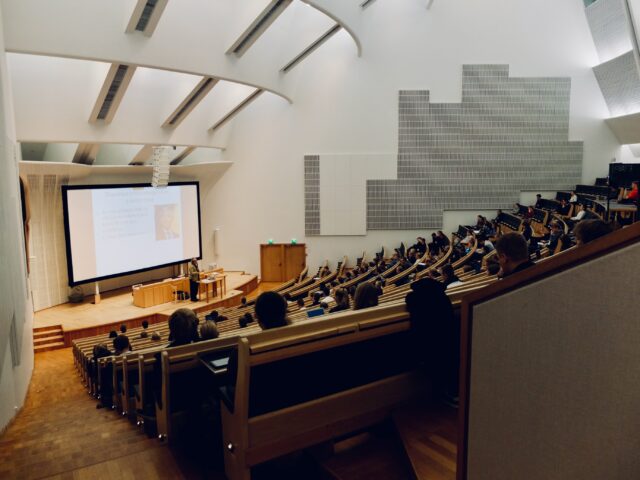The Mastercard Foundation has announced $235M in funding to 30 Indigenous-led organizations and postsecondary institutions across Canada, marking the 10th anniversary of the Truth and Reconciliation Commission’s Final Report. Ten Indigenous postsecondary institutions—First Nations Technical Institute, First Nations University of Canada, Gabriel Dumont Institute of Native Studies and Applied Research, Kenjgewin Teg, Mi’kai’sto Red Crow Community College, Nicola Valley Institute of Technology, Saskatchewan Indian Institute of Technologies, Seven Generations Education Institute, Six Nations Polytechnic, and University nuhelot’įne thaiyots’į nistameyimâkanak Blue Quills—will each receive $10M to scale culturally relevant programs. Additionally, 17 postsecondary institutions will each receive $5M to expand Indigenous partnerships.

Top Ten News
September 10, 2025
Two Globe and Mail features explore the persistent gender gap in Canadian postsecondary enrolment, with women now making up nearly 60% of undergraduate students. Reporter Joe Friesen highlights contributing factors such as lower academic performance among young men, behavioural challenges, and skepticism about the value of higher education. Though men still out-earn women on average, the implications of the enrolment gap extend beyond income, explains Friesen. Columnist Marsha Lederman, in a separate piece, builds on Friesen’s piece, arguing that declining male enrolment could affect civic engagement, mental health, and social cohesion. She emphasizes that postsecondary education fosters critical thinking, empathy, and community participation—benefits that go beyond economic opportunity.
The University of Lethbridge has unveiled a new brand and logo inspired by Indigenous culture. The design features yellow “sun” beams with four longer, interspersed yellow “poles,” symbolizing a four-poled tipi opening upward toward the sun. ULethbridge Director of Iniskim Indigenous Relations Shanda Webber explained that the logo mirrors the four foundational poles in the university’s strategic plan, which “are instrumental in providing a home away from home for not only our students, but our staff—and really inviting our Indigenous relations and community members to say, ‘This is your place as well.’” ULethbridge noted that the rebranding process included input from over 1,000 participants, and that the existing Pronghorn athletic brand will remain unchanged.
In a recent article for The Conversation, University of Northern British Columbia Assistant Professor Taylor Morphett argues that large language models (LLMs) expose long-standing tensions in how writing is understood and taught in postsecondary settings. Treating AI output as “writing,” she argues, reflects a misunderstanding of a cognitive process that helps people develop their own ideas. “The truth is, if university instructors are only interested in a ‘correct’ piece of writing, it sort of makes sense for a computer to do it,” she writes. In conclusion, Morphett calls for writing to be embraced as a process of inquiry and invention, and for postsecondary institutions to include writing experts involved in shaping AI policy.
NOSM University has announced four new residency programs in Emergency Medicine, Family Medicine Enhanced Skills in Palliative Care, Medical Oncology, and Obstetrics and Gynecology. The programs are part of the university’s plan to grow the number of medical students and incoming residents by 2028. “These new residency programs represent a major step forward in NOSM University’s expansion plan and in transforming access to health care in Northern Ontario,” said NOSM Associate Dean of Postgraduate Medical Education Rob Anderson.
Saskatchewan Indian Institute of Technologies has announced that it will expand its Information Technology Support Specialist program to its Regina campus. This program, which was previously offered only in Saskatoon, will be offered in Regina starting in the Fall semester. The expansion is funded by a more than $1.3M investment from PrairiesCan. SIIT Dean Andrea Sanderson explained that this investment will help the program reach more students, who will develop their skillsets so they can meet the demand for tech workers in the province.
Concordia University is advancing open science and open scholarship with a new Senate-approved resolution that embeds these principles across the institution. The move towards open science aligns with directives by the federal government that any publicly funded research be open “by design and by default” by 2025 and is the newest of several initiatives by Concordia to advance open science since 2010. Concordia Research Chair Krista Byers-Heinlein described the benefits of open science in the past several years: “My students have embraced it, it’s strengthened our collaborations, and other researchers have used our materials, data, and analysis code to make new discoveries.”
Professors at Western University’s Ivey Business School are using virtual reality (VR) to help students build the perspective-taking skills essential for effective leadership. Spearheaded by Western Professor Shannon Rawski, the project immerses students in simulations of team meetings—first as a neutral observer, then from the perspective of a marginalized participant. The goal is to help students practice empathy and see how ordinary interactions can feel different across identities. “Perspective-taking in meetings isn’t something we’re born with, and it’s not easily taught,” said Rawski. “It takes real-world practice.” Feedback from early pilots has been “extremely rich,” said Western Professor Zoe Kinias, who is co-leading the initiative.
AI should not be dismissed as simply a tool for cheaters and the lazy, argues Agnieszka Piotrowska (University of Gdańsk). Piotrowska discusses a Massachusetts Institute of Technology study that claims large language model users may face a 47% decline in brain activity, asserting that this is not the whole story. Sharing how she uses AI in her research as a tool to support her own creativity, Piotrowska emphasizes the distinction between “outsourcing thought” and “using [AI] to think better.” She then compares AI to other developments—including calculators, the internet, and written language—to conclude that despite the discomfort surrounding something new, academics should approach the tool in a way that ensures the partnership with it is “conscious, ethical and transformative.”
Algoma University has announced that it has joined the Royal Society of Canada as an Institutional Member. As a member, the university becomes part of a group of Canadian universities that are united in their commitment to advancing the arts, research, and scholarship at a national level. “As a smaller institution with a distinctive Special Mission rooted in cross-cultural education, reconciliation, inclusion, and innovation, this membership further positions AlgomaU as a bridge between science, knowledge creation, culture, and community,” said AlgomaU Interim President Sheila Embleton.
